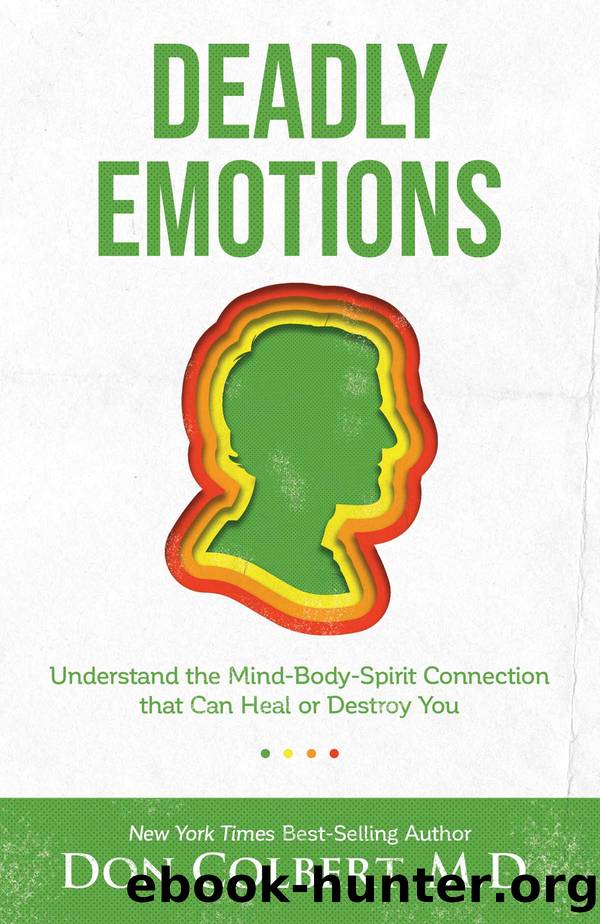Deadly Emotions by Don Colbert

Author:Don Colbert
Language: eng
Format: epub
Publisher: Thomas Nelson
Published: 2020-08-02T00:00:00+00:00
â¢In the case of rheumatoid arthritis, the tissue around the joints (synovium) is attacked and may be eventually destroyed.
â¢In multiple sclerosis, another autoimmune disease, the myelin sheath, which covers the nerves, is attacked.
â¢In Hashimoto thyroiditis, the immune system assaults the thyroid gland.
â¢In psoriasis, the immune system targets the skin.
â¢In Type 1 diabetes, the islet cells of the pancreas are the goal.
Other autoimmune diseases seem to be more and more prevalent in our society, among them lupus, ulcerative colitis, and Crohnâs disease.
With an autoimmune disease, not only does the body see its own tissue as an invader and begin to attack, but a personâs general moods and sense of well-being are nearly always affected. Thatâs because the immune system on the attack generates blood proteins called cytokines, which are known to induce fatigue and depression.2
The brain is able to send both hormonal and nervous signals to suppress the immune system when under stress. When there is a disruption of the regulatory influence of the brain on the immune system, it can lead to increased immune activity and a greater chance of developing inflammatory and autoimmune disease.3
Autoimmune disease researchers Sternberg and Gold believe that the brainâs ability to regulate itself is also disrupted during an autoimmune attack. This creates even more autoimmune response, which spawns even more inflammation. The downward spiral can be dramatic and frightening.
As we have discussed previously, the brain and the bodyâs immune system communicate in a two-way fashion in an ongoing manner. The brain has the ability to suppress immune function during periods of stress. But when a disruption occurs in the regulatory ability of the brain, the immune activity or immune response can shift into overdrive and remain stuck there. This may very well be the mechanism that leads to autoimmune disease.4
And as we have also discussed previously, during periods of stress, glucocorticoids such as cortisol cause a temporary ârevving upâ of the immune system. The amount of cortisol released over time is a major factor related to immunity. A significant stress event, such as the loss of a loved one, can cause the adrenal glands to secrete a particularly large amount of cortisol. This generally leads to immune suppression, a lowering of immunity in the body.
Ongoing, continuous, more mundane stress, the day-to-day variety, causes the adrenal glands to secrete smaller amounts of cortisol, which actually stimulates the immune system. When this activation of the immune system occurs again and again, an autoimmune disease may result. The body becomes confusedânot knowing if itâs really necessary to flee or fight, not really sure whom or what to flee from, or whom or what to fight!
God intended that the adrenal glands and the release of cortisol would enable a person to escape traumatic situations and dangerous predators. The body was never supposed to administer cortisol many times throughout the day for minor stresses. The drip, drip, drip effect of smaller doses of cortisol sends the signal âRev up the immune system! Something must be attacking us.â When the body
Download
This site does not store any files on its server. We only index and link to content provided by other sites. Please contact the content providers to delete copyright contents if any and email us, we'll remove relevant links or contents immediately.
The 5 Love Languages: The Secret to Love That Lasts by Gary Chapman(8499)
The Space Between by Michelle L. Teichman(6088)
Assassin’s Fate by Robin Hobb(5238)
Wiseguy by Nicholas Pileggi(4586)
Everything Happens for a Reason by Kate Bowler(4067)
Gerald's Game by Stephen King(3919)
A Simplified Life by Emily Ley(3573)
The Power of Positive Thinking by Norman Vincent Peale(3450)
Pillow Thoughts by Courtney Peppernell(3398)
Resisting Happiness by Matthew Kelly(2888)
Girl, Wash Your Face by Rachel Hollis(2822)
Being Aware of Being Aware by Rupert Spira(2709)
Name Book, The: Over 10,000 Names--Their Meanings, Origins, and Spiritual Significance by Astoria Dorothy(2492)
Real Sex by Lauren F. Winner(2476)
More Language of Letting Go: 366 New Daily Meditations by Melody Beattie(2444)
The Holy Spirit by Billy Graham(2418)
Fast Facts on Defending Your Faith by John Ankerberg & John Weldon(2390)
Victory over the Darkness by Neil T. Anderson(2386)
The Secret Power of Speaking God's Word by Joyce Meyer(2253)
